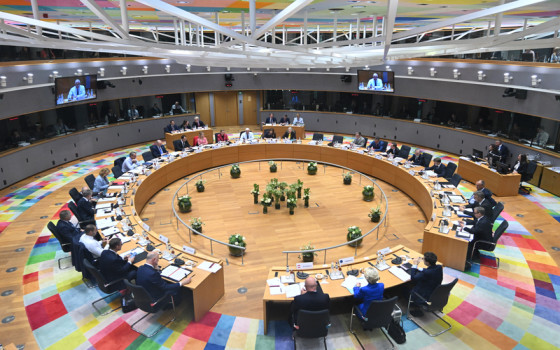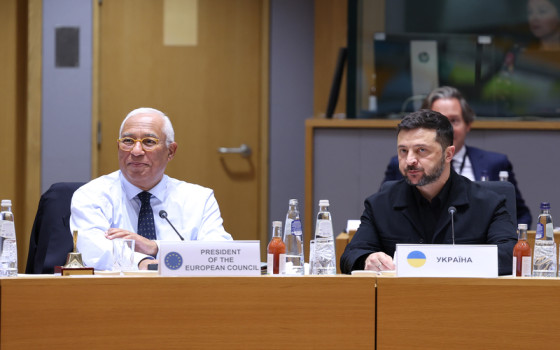EU Summit: First step toward a €140 billion loan to Ukraine using frozen Russian assets, Belgium has reservations... Decisions on defense, climate, and competitiveness issues...

- Europe and Arabs
- Friday , 24 October 2025 10:10 AM GMT
Brussels: Europe and the Arabs
European Union leaders have taken a cautious first step toward a loan for Ukraine using Russian assets.
Brussels. At the European summit in Brussels, no one objected to the proposal to provide financial support to Ukraine through a loan based on frozen Russian assets, European Council President António Costa said Thursday evening. Although no political agreement was reached, it was decided that the European Commission should develop concrete options by the next summit. According to the Belgian news agency, the plan, which could generate up to €140 billion for Ukraine, is facing reservations, particularly in Belgium. She added, "Belgium, through Euroclear, owns the majority of frozen Russian assets and fears legal and financial consequences. Prime Minister Bart De Wever set three conditions for supporting the proposal, including a fair distribution of risks. However, he did not formally object, which Costa considers an important step forward.
Commission President Ursula von der Leyen confirmed that the loan idea is still on the table. She said, "We agreed on the 'what,' now we have to decide the 'how.'" Both Christine Lagarde of the European Central Bank and Paschal Donohoe of the Eurogroup stated that the proposal is legally justified under international law.
EU leaders affirmed their commitment to continuing to provide financial support to Ukraine in 2026 and 2027. The European Commission will develop alternative financing models in the coming weeks, with the aim of reaching a final decision in December. “Earlier this month, after our informal meeting in Copenhagen, I said today was the time to decide,” EU President Antonio Costa said at the closing press conference of the leaders’ discussions on Thursday evening. “And we have kept our promises. On all fronts. Starting with Ukraine. We have repeatedly affirmed that we will support Ukraine as much as possible and for as long as possible. Today, we reached three important agreements:
First, European leaders committed to ensuring that Ukraine’s financial needs are covered for the next two years. We asked the Commission to present “options” as soon as possible, so that Ukraine has the resources to continue its defense and fight for a just and lasting peace in 2026 and 2027, if necessary.
Russia must be well aware that Ukraine will have the financial resources necessary to defend itself against Russian aggression for the foreseeable future.
Now, the technical, legal, and financial aspects of European support must be worked out, and we will return to this issue at the European Council in December.
Second, we adopted the 19th package of sanctions, which will increase our pressure on Russia and inflict more damage.” Damage to its war machine.
Thirdly, member states agreed to strengthen measures and coordinate actions to disrupt Russia's secret fleet.
In short: We continue to use all means at our disposal to put Ukraine in a position of strength if negotiations with Putin begin. We hope that moment will come soon. But whatever the circumstances, our message is clear: Europe will not let Ukraine down.
The second area in which the European Council achieved its goals today is defense.
Today, we concluded a cycle we began last February, when I convened a brainstorming session dedicated to this topic. In less than a year, and in close cooperation with the European Commission, we have laid the foundations for a defense-minded Europe.
We have defined our priorities and capabilities. We have agreed on new financial instruments to develop these capabilities, in full coordination with NATO.
Our priorities are now clear, starting with air defense systems and drones. We are, of course, looking to our eastern flank. Our timelines are also:
The first step is to finalize by the end of this year the "capabilities alliances" that will drive these projects forward;
The second step is to launch concrete projects and move them forward in early 2020. 2026.
Member states will take the lead in driving our joint efforts forward, with a greater role for Defense Ministers and the European Defense Agency.
Europe's defense is not just about spending more, but also spending smarter, working together, and delivering for our citizens. This is how we build European sovereignty. The Roadmap on Defense Readiness presented today by the European Commission and the High Representative was a crucial cornerstone of this.
Third: Competitiveness and Climate.
Europe is at the forefront of climate action, transforming this challenge into economic opportunities and positioning itself as a leader in the technologies of the future.
Today, we reaffirmed our commitment to the Paris Agreement and also agreed that our strategy must be pragmatic and flexible. This will ensure that Europe's climate ambitions are integrated with the competitiveness of our economy and industries, leaving no one behind.
Looking ahead to 2040, we are charting a clear and realistic path to achieving our climate goals:
By ensuring our transition is just and affordable for citizens and businesses;
By supporting the modernization and decarbonization of our industries;
By following the principle of net neutrality. technological, to ensure we achieve our goals in the most cost-effective way;
and by ensuring that this transition contributes to building a solid European industrial base.
At the same time, we will encourage innovation. We will invest in clean and digital technology, to ensure Europe remains at the forefront of the global race. This is what we discussed.
I believe that today's meeting, along with Ursula von der Leyen's recent message, has contributed to creating the right conditions for the EU's 2040 climate target, which will now be decided in the Council.
As Mario Draghi's report made clear a year ago, Europe needs to become more competitive to secure its future. The clean and digital transition, along with our simplification efforts, which we have decided to pursue resolutely, are essential parts of our agenda to ensure Europe's international competitiveness.
Last but not least, to be stronger externally, we need to be strong internally. Leaders also need to focus on the daily concerns of European citizens.
Housing affordability and accessibility are among the most pressing and tangible issues for millions of Europeans.
Although Competencies in this area remain at the national, regional, and local levels, and I wanted European leaders to come together to discuss how the EU can contribute to and support their efforts. Our discussion was very useful and tangible. It provided political guidance for the European Commission's preparation of the European Affordable Housing Plan.














No Comments Found